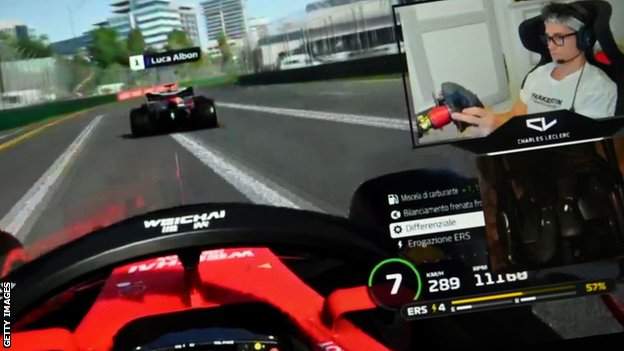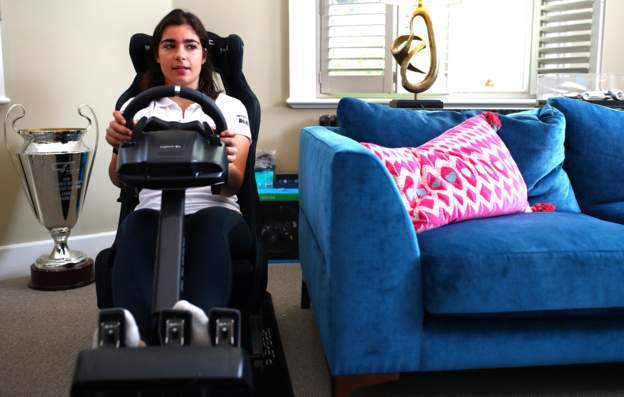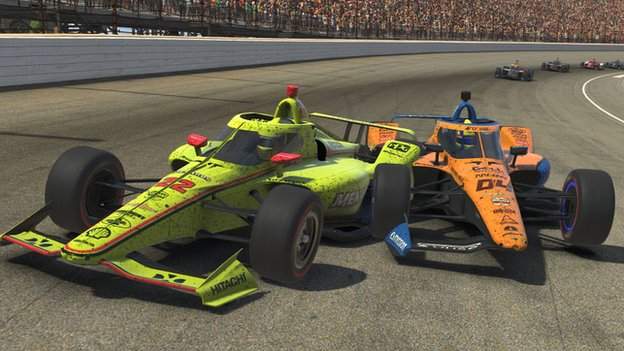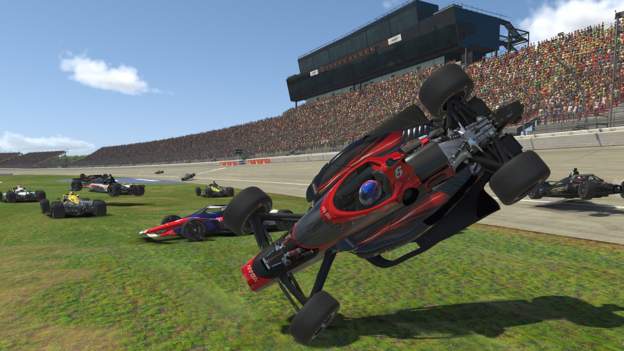By Gary RoseBBC Sport
Last updated on .From the section Formula 1

The return of Formula 1 is edging ever closer with the season finally due to get under way next month, but where does that leave the world of esports?
When lockdowns were put in place throughout the world and sporting events were suspended, many racing drivers from F1 and other sports took to virtual circuits to help pass the time.
But with 22 million viewers having tuned into the virtual races, the temporary switch to esports has proved to be a huge success. So what’s next for the sport now drivers are set to depart? And how did it all first come about?
When did the turn to esports kick in?
When the magnitude of the coronavirus pandemic became clear and Formula 1 finally decided to postpone the season on the eve of the opening race, the world of esports was quick to step in to offer an alternative.
Veloce, one of esports leading teams that competes in racing games as well as other titles such as Fifa and Rocket League, swiftly put together the Not The Aus GP – a virtual version of the Australian Grand Prix that was held on the same day the real F1 season opener would have taken place.
McLaren driver Lando Norris, a keen sim racer in his spare time, was quick to get involved while other sports stars such as Real Madrid goalkeeper Thibaut Courtois and several YouTube personalities were also invited to take part.
It was a resounding success as the #NotTheAusGP hashtag trended throughout the day while the stream of the race itself had more than 175,000 viewers at its peak.
An explosion of other Esports events soon followed – not just in other racing disciplines but also in football through Fifa and cycling via Zwift, which culminated recently when a host of sports stars and celebrities attempted to chase down four-time Tour de France winner Chris Froome in a virtual bike race.
How big has it become?
This weekend was a significant one in the Esports/real sports crossover.
Four current F1 drivers took part in the finale of the F1 Esports Virtual Grand Prix series. Meanwhile, a virtual Le Mans 24 hours took place. With 200 drivers involved, including former F1 world champions Fernando Alonso and Jenson Button and current drivers Max Verstappen and Lando Norris – it was one of the biggest racing events in esports.
Other racing series have also made a successful switch to online. Formula E’s Race at Home Challenge, which utilised the rFactor game, came to an end earlier this month, with ex-F1 driver Stoffel Vandoorne claiming the title.
There was even controversy, however, with Formula E driver Daniel Abt being found to have used a ringer in one of the races. Abt was later suspended and released by his team Audi.

But while some are ending, another is just beginning with the W Series’ Esports League having got under way on Thursday.
The all-female championship, which is being broadcast on BBC iPlayer and online, runs until 13 August and has replaced the W Series season after it was called off because of the coronavirus.
Just how seriously have the drivers taken it?
The approach to virtual racing from F1 drivers in the real world was varied.
For Max Verstappen, sim racing has always been serious business, so much so that he would not get involved in the virtual races that replaced cancelled or postponed real-life grands prix because he was not familiar with the F1 2019 game being used. The Dutch driver instead stuck to the more realistic iRacing game, in which cars sustain damage – unlike the F1 version, which has that jeopardy removed.
Reigning world champion Lewis Hamilton has not competed in any of the Virtual Grand Prix races, with his foray into the online world having been largely restricted to playing F1 rivals Charles Leclerc and Pierre Gasly on the video game Call Of Duty.

But the likes of Norris and George Russell threw themselves wholly into the world of online racing and are undoubtedly reaping the rewards of doing so, seeing their profiles raised in perhaps unexpected ways.
Russell, quickly discovered he was actually rather good at it, winning four straight virtual races including Sunday’s Canada finale, in which he claimed the title.
What happens when the drivers leave behind the virtual world?
The world of esports is growing in both scope and popularity every year and the 2019 F1 esports series drew in 5.8 million online viewers across the season.
Four times that having tuned in to watch F1’s virtual grand prix series with the mix of F1 drivers, other sports stars, celebrities and talented sim racers.
The industry was already growing in scope and popularity before it took to the main stage over the last few months and many believe that this period will only serve to enhance its growth further.
“This has given us a chance to show our platform and hopefully it has opened up a lot of minds that esports can be a serious competition,” Lucas Blakeley, a Formula 1 esports driver for Racing Point, told BBC Sport.
“I think it has been critical for the esports world when you see F1 drivers talking about the game and taking it seriously.”
If there’s one thing we’ve learned during lockdown, it’s that esports has become more than just a bit of fun.
